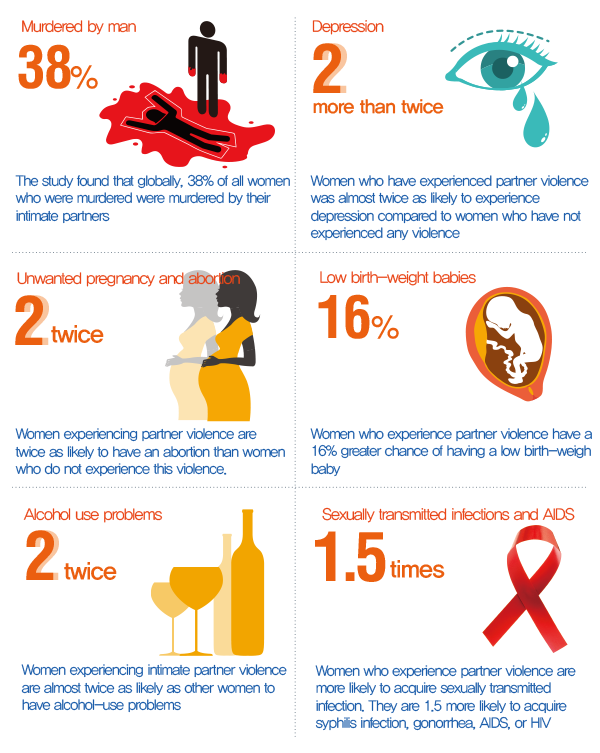Have you ever heard about the old Korean saying that women should be beaten at least once every three days? It's one of the most controversial sayings online in Korea. Violence against women is happening too frequently to regard it as just a phrase used by some people with specific tendency. And committing violence towards women for crazy reasons like "love" must end now.
 Source: ImageToday |
In the end of November 2015, an interesting study was reported. It showed that violent crime rates surged in a country with gender imbalance. According to a study by Prof. Lena Edlund at Columbia University and others, a single point rise in the sex ratio of men aged 16 to 25 raised property and violent crime by between 5% and 6% in China. In addition, China has seen a dramatic increase in youth crime since the 1990s, and the Columbia study attributed as much as one third of that rise to the increase in the maleness of the young adult population. The theory is that unmarried men are likely to commit crimes as they try to accumulate assets to compete for scarce brides.
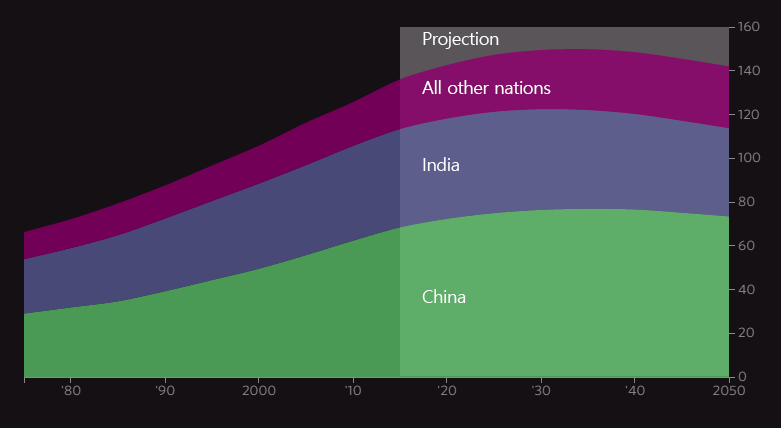 Accordingto a study published by a New York-based Population Council, there were 88million missing women world-wide in 1990. There were 126 million missing in2010. The paper projects an increase to 150 million missing by 2035 and then aslight decrease to 142 million by 2050.
|
The sex ratio imbalance is expected to continue for a while. More than 21% of Chinese men is expected to remain unmarried at 50 in 2070, while in India the number is expected to be nearly 15%. But, is the sex ratio indeed the cause of all types of violence and crime? What happens if we only look at violence against women?
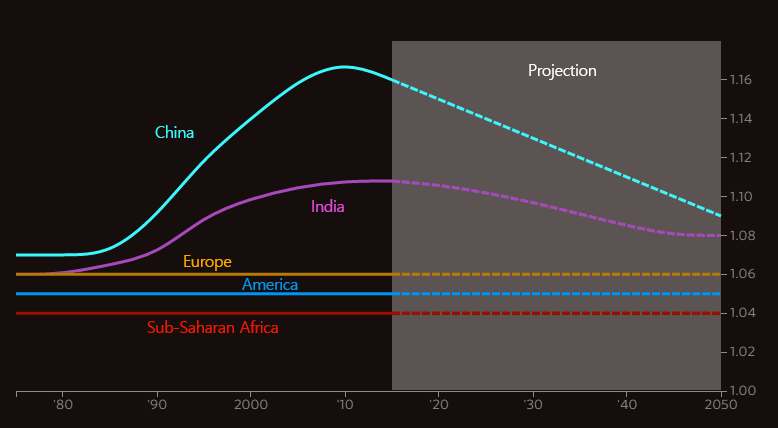 Sex ratio data by countries
|
According to a data published by the World Health Organization (WHO) in 2013, around 30% of women globally have experienced physical or sexual violence by a partner in their lifetime. And the number increased to 35% when including violence by a non-partner. According to the data, 37.7% of women in Southeast Asian countries, including Bangladesh, India, Myanmar, Sri Lanka and Thailand, experienced intimate partner violence. In Southwest Asian countries, such as Egypt, Iran, Iraq, Jordan and Palestine, 37% of women experienced violence. In African countries including Botswana, Cameroon, Ethiopia and Kenya, the number reached to 36.6%. For combined intimate partner and non-partner sexual violence against women, prevalence rates were as follows:
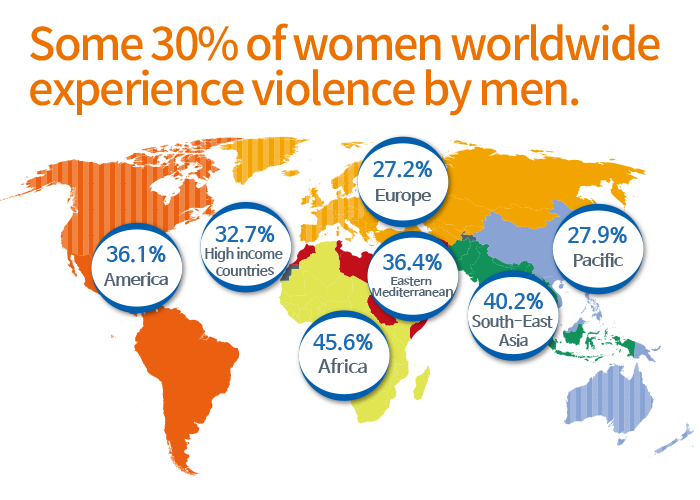 Some 30% of women worldwide experience violence by men. America: 36.1%,Africa: 45.6%,Eastern Mediterranean: 36.4%, Europe: 27.2%, South-East Asia: 40.2%, and Pacific: 27.9%. Highincome countries: 32.7% |
In fact, the data showed that the rate of violence was not exceptionally high in underdeveloped regions or developing countries. However, violence against women was slightly low in the countries with similar proportion of men to women. In fact, those women who have experienced physical sexual violence were in serious condition.
|
The Wall Street journal chose the gender imbalance as the reason of violence. The WSJ reported that the notion of preferring a son to a daughter is behind the gender imbalance. In other words, social crimes are happening as the result of the skewed sex ratios in India and China with a strong tradition of son preference. On the other hand, the WSJ explained that Korea is showing dramatic changes after going away from a typical society of son preference.
South Korea was once a country with a strong tradition of son preference.
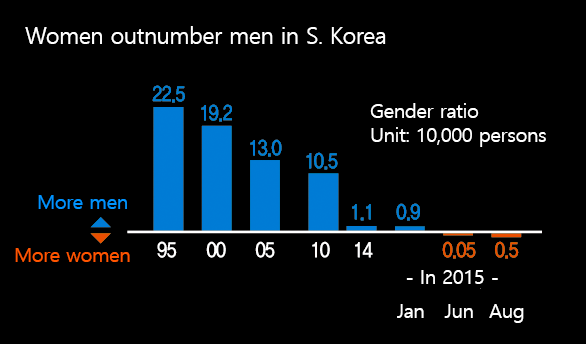 By1990, the ratio of male-to-female babies soared in Korea, at 116.5 males forevery 100 females. |
In 80s, selective abortion was frequent as fetal ultrasound test became commonplace. However, after 90, South Korea did a U-turn with a media law banning the sex detection of a fetus. Rather, the atmosphere of daughter preference can be sensed these days in Korea.
As an atmosphere of daughter preference is forming out, some experts say that the patriarchal society is moving to matriarchal society. Kada Second Clinic's Dr. Makabe Sayoko, who has been counseling umiwake (the general methods of preselecting sex of offspring) for more than 20 years, says she is seeing the changes.
"In the past, people from rich or noble family who wanted to give birth to a baby boy made a visit, but now ordinary people come to give birth to a baby girl."
In Japan, the paternal society is collapsing while this 'daughter society' phenomenon is becoming evident. Why the current Japanese society is preferring more daughters over sons?
"People's consciousness of 'lineage' has faded away. Instead of 'parenting a successor', the trend is changing into 'happy nurturing of parents and children'," said Prof. Nakanishi Yasko at Sagami Women's University.
In fact, among mothers who wanted to have a daughter, many said they wanted to go shopping with their children together. There are also expectations for retirement. In fact, a 2010 survey conducted by Japans National Institute of Population and Social Security Research found that among people who want to have one child, 68% wanted to have a daughter while 31% wanted a baby boy.
"In South Korea, the eldest son had an important role of hosting family events. But after the economic crisis in 1997, the number of large family events reduced and the trend changed," said Prof. Sechiyama.
He said, "Due to high cost of education, the birthrate decreased sharply. As a result, the tradition of preferring sons is fainting." He added that when he was in Korea in 1990s, there was still an atmosphere of preferring sons, but the trend changed only in few decades."
Criticisms have leveled against 'preimplantation genetic diagnosis', which is conducted only in USA, Thailand, and Japan. In Japan, where genetic diagnosis is allowed in preimplantation stage, frozen embryos made with sperms and egg of a couple who want genetic diagnosis, are sent to the United States. From determining gender of the chromosome, to implementation to childbirth cost only 3 million yen (approx. 28.4 million won).
It's not just happening in Japan. Selective pregnancy is happening in Korea, too. This may again bring up the issue of 'gender imbalance.' For now, there is no law neither in Japan or Korea to prohibit pregnancy after receiving gender diagnosis in other countries.
Meanwhile, China and India have recently taken action to reduce sex selection of fetuses to promote gender equality. China abandoned its one-child policy. As a result, its excessive gender imbalance is expected to disappear gradually.
But let's go back to the fundamental problems. If the sex ratio at birth were to return to normal, will the violence against women reduce?
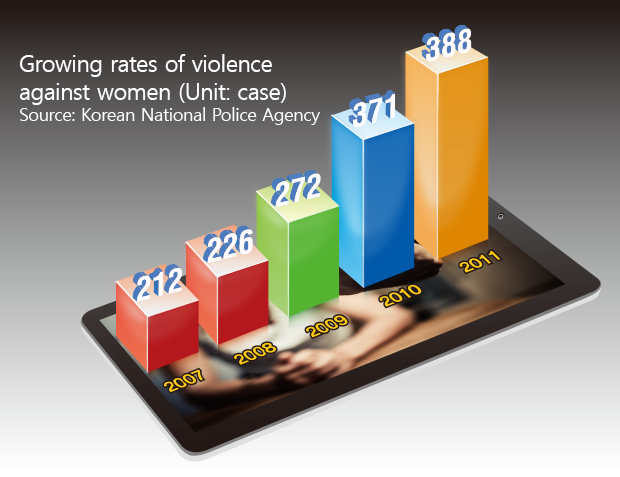 Increaseof violence against women in Korea |
 |
Mark Zuckerberg, founder and CEO of Facebook, recently announced his decision to donate 99% of Facebook stock to charity on the occasion of birth of his daughter. In the open letter to his daughter, Zuckerberg wrote,
"Like all parents, we want you to grow up in a world better than ours today. Technology can't solve problems by itself. Building a better world starts with building strong and healthy communities. We feel a great responsibility to leave the world a better place for you and all children."
Most Read
-
1
-
2
-
3
-
4
-
5
-
6
-
7








